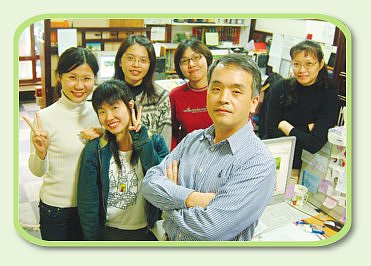|
Vegetarian Era
|
By Taipei News Group, Formosa (Originally in Chinese)

   |
"Vegetarian diet ~ a pristine taste; vegetarianism ~ a beautiful lifestyle; vegetarian people ~ good friends who persist in what is good; vegetarian planet ~ a clean and green abode for all beings." "One person is a lonesome vegetarian; two persons are good companions on the vegetarian path; three persons make a vegetarian planet full of love and happiness!" This is the mutual dream of Mr. Linxu Wen-er and his wife, founders of Vegeplanet.com.
Being experienced media workers, writers, cultural workers, publishers and creators of Vegeplanet.com, Mr. Linxu and his wife Chen Shi-lan regard themselves as "vegetarian cultural workers." They said that there are many outstanding vegetarians, yet vegetarianism is often associated with religion. Unless vegetarians develop a broader vision and greater self-confidence it will be difficult to change the view that vegetarianism is no more than a religious practice.
"We want to devote our abilities
to creating a global vision wherein vegetarians are more self-confident
and aware that the vegetarian diet is not only beneficial to themselves
and meaningful to their families, but also a universal value that will
have an impact on the planet, the future and the world as a whole,"
said the couple. "From reports on our website, people learn that
there are many famous personalities and unknown ordinary people committed
to this same goal in our society and in different places around the world.
They may have different religious beliefs, but are doing the same thing.?
They added, "Once vegetarians gain confidence, they can make greater
contributions to different domains. If they are in commerce, they can
rely on their growing strength to promote related businesses. If they
are in politics, they can push for the passage of certain bills. We hope
to help the vegetarian population enhance their confidence and attract
more talented people to devote themselves to promoting the vegetarian
diet."
The Linxus have come a long way, having left the prosperous but fast changing TV advertising industry to practice Buddhism and adopt a vegetarian diet. They had then taken an interest in cultural publishing before committing themselves to promoting vegetarianism. "Most people believe in religions but only take it as knowledge. We don't want to be held to that mental level where beliefs are not put into practice. To promote vegetarianism, we prefer not to talk too much about religious doctrines. Instead, we choose to become devoted vegetarians and influence other people to follow that diet. This is more practical and no less effective than a religious approach."
While most people think that a kind heart is good enough and vegetarianism is not necessary, the Linxus have a different opinion. "Everyone wants the world to be better, but not many are taking any action. That is not the way," said the couple. "By becoming vegetarian, one has contributed a great deal that is beyond language. For example, by choosing to take one vegetarian meal, we indirectly encourage farmers to grow more vegetables and reduce intensive livestock farming. Animals get a chance to live a better life and the air quality also improves."
The couple humbly said that they did
not know much about Supreme Master Ching Hai's teachings. "But we
know many friends from The Supreme Master Ching Hai International Association,
and we feel very comfortable in their company," they said. "Besides,
the Association has been doing its best, even better than some religious
groups, to promote vegetarianism in Formosa. Occasionally when we see
your fellow initiates distributing leaflets on the road, we feel deeply
touched. Few religious groups in Formosa are willing to do this. Therefore,
we admire you very much."![]()
Note: Linxu Wen-er and Chen Shi-lan started studying Buddhism and the Indian culture in 1991. Eight years later, they journeyed to India to explore the origin of Buddhism, undertaking a difficult pilgrimage that culminated in the writing of a comprehensive book, on ten major holy places related to the Buddha, entitled
"Travelogue on Holy Places of India." The couple traveled extensively in India
and went on to publish a number of other books, including "Varanasi" and "The Stupas of Sanchi
-- An Epic Poem of Indian Buddhism."
Website URL: http://www.vegeplanet.com
| << | Contents | >> |
|
Refer this page to friends
|
||